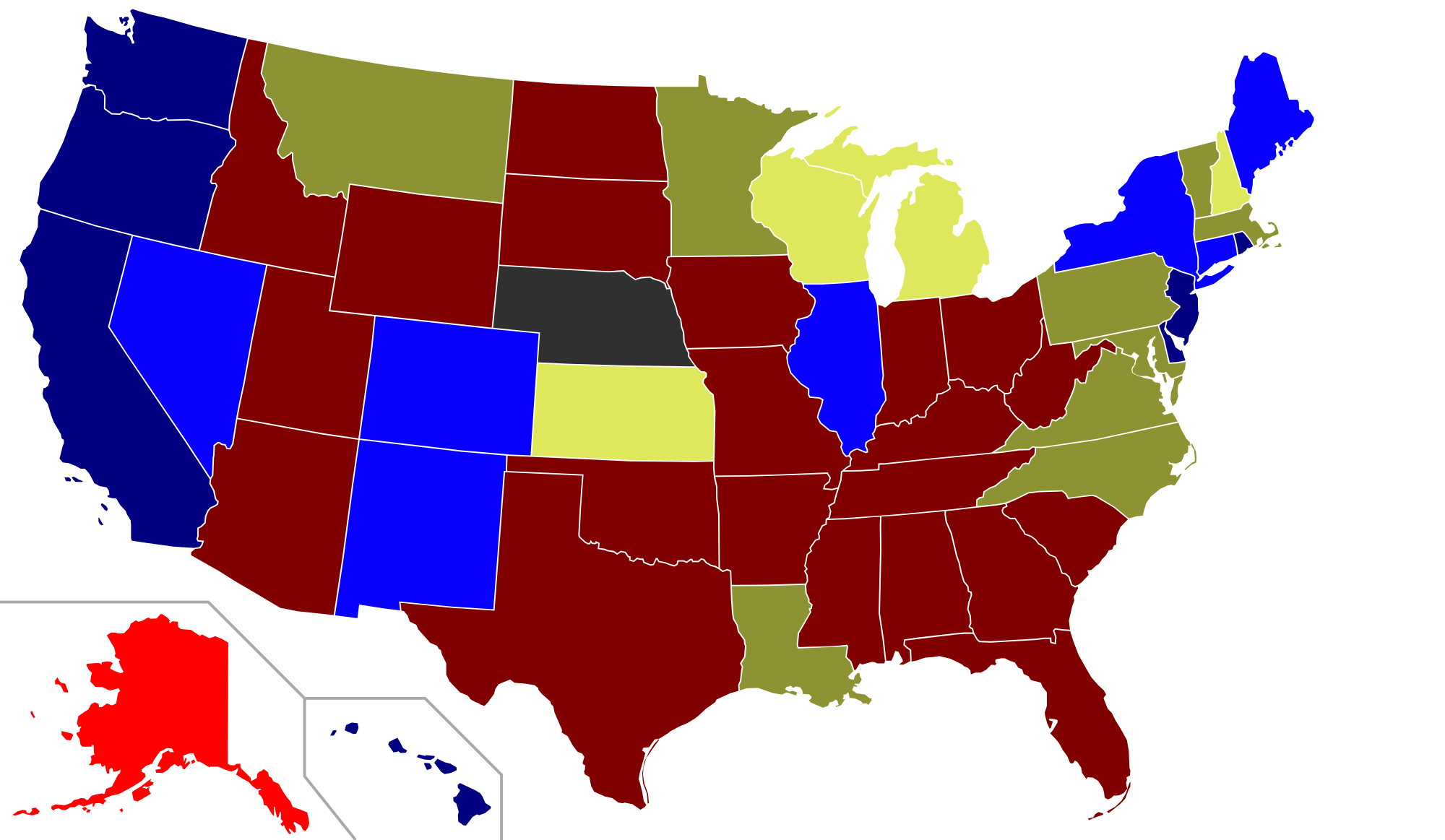November’s midterm elections served up a revised portrait of our political landscape, with harbingers of hardening political fault lines and clues to the future direction of the country.
The national map was remade by the introduction of new pockets of blue in places where before there had been only, or mostly, red. To Democratic National Committee Chairman Tom Perez, this outcome is a vindication of the party’s 50-state strategy and disciplined and coordinated messaging. “We’re competing everywhere, we’re organizing everywhere,” Perez told NPR’s Ailsa Chang on election night.
Yet to the progressive activists who sparked candidacies up and down the ballot and staffed and funded state and federal campaigns throughout the country, Democratic gains in the midterms often came despite the party’s reluctance to engage the energy and idealism on the left. This tension has surfaced in midterm postmortems and is certain to play out in the coming debate over how best to position the party to win back the White House and strengthen the Democratic ranks in 2020. The editors at Jacobin put it this way: “It’s still too early to know exactly what lesson the 2018 midterms can offer the American left, but at least one thing is clear—Trumpism isn’t unbreakable. But it will take more than moral outrage to beat it back.”
Democratic women, diversity and progressive mobilization were the story lines in the midterms. Muslim women, African American women, Native American women, and Latina women all claimed governorships and congressional seats and state legislative positions across the country, relying in part on the surging social justice movement rooted especially in communities of color, and among youth, women, and the LGBTQ community.
Still, as Rebecca Traister reports in The Cut, “white women voted in chillingly high majorities for white patriarchs and the party they represent; in Georgia, according to exit polls, 76 percent of white women—shockingly, a higher percentage than white men—voted for Stacey Abrams’s opponent Brian Kemp.”
The next Congress will reveal whether Republicans feel pressure to soften their resistance to policies championed by Democratic women, to distance themselves from Trump’s misogyny, and to reject the overt racism of his appeal to his base—or if they will double down on the themes that led to the midterm rout.
Democrats also made important gains in high-income suburban districts by calling out Republican incumbents loyal to Trump, his agenda, and his conduct, and they also broke through in the outer suburban districts that Trump had carried by single digits.
By retaking the House with a gain of at least 37 seats, and most likely 38–40, Democrats can fend off the Trump spending agenda and attempt to hold the conflict-saturated president and the members of his scandal-plagued administration accountable.
There will be little time for Democrats to savor their victory. As veteran investigations specialist Jack Blum argued in the November issue of The Washington Spectator, Democrats need to start the process of rule-making, budgeting, and staffing up immediately if they expect to manage credible investigations into high-level corruption and malfeasance beginning in the new year.
Trump, for his part, moved quickly to insulate himself against the fallout from the ongoing Mueller investigation, by forcing the resignation of Attorney General Jeff Sessions, who had recused himself from oversight of the probe. Yet this step—intended to shore up his presidency—was characteristically impulsive and contemptuous of process and raised a new round of constitutional concerns.
To replace Sessions, Trump installed Matthew Whitaker—described even by conservative analysts as a political hack with a shady past and a slender résumé and depicted by the normally reserved New York Times as an “attack dog.” Whitaker, who has accused Mueller of going “too far” and has called for limiting the scope of his investigation, will now take over the job of overseeing Mueller from Deputy Attorney General Rod Rosenstein. What impact this development will have on whether the public will eventually be allowed to view Mueller’s findings remains to be seen. It is not yet clear whether Whitaker is a temporary appointment or if he is auditioning for the job. Trump, meanwhile, is reportedly reviewing equally dismal candidates for a more permanent replacement for Sessions, including the volatile former New Jersey Governor Chris Christie and Kris Kobach, the anti-immigrant provocateur and voter-suppression specialist.
Trump’s reconfiguration of his Mueller defense is carefully timed. He waited until after the election to jettison Sessions, a son of the South, and has already publicly threatened the House Democratic majority that if they follow through on their pledge to investigate him, they can expect Senate Republicans to retaliate by using their own investigative authority to look into alleged Democratic misconduct over the handling of classified information.
It is unlikely the House Democratic caucus will have an appetite for impeachment proceedings—that now seems ill-advised on several grounds, not the least being the gains achieved by Senate Republicans in the midterms and their control over that chamber. But even if impeachment fever peters out, House Democrats and the president are on a collision course over the interpretation and enforcement of the Constitution. There will be fights over documents and taxes, over testimony, over appointments, over what constitutes inurement, conflicts of interest, and the presence of family members on the White House payroll—and, perhaps most tantalizingly, at least one investigative path takes us back to Christine Blasey Ford.
Ford’s searing presence last September at the Kavanaugh confirmation hearings was a unifying moment for Democratic women all over the country who were demanding to be heard, and likely contributed to the energy behind the election of a record number of women to Congress in the midterms. (It’s also been noted on the right that Ford’s 11th-hour testimony and Kavanaugh’s indignant defense also helped spur Republicans, who turned out in record numbers to salvage a number of precarious House and Senate races.)
Ford’s testimony forced Kavanaugh out of his comfort zone, obliged him to respond more substantively to aggressive questioning, and enabled the national audience to see him more as a partisan Republican fixer than the girls’ softball coach that the Federalist Society had so carefully scripted. And it’s that testimony that Jerrold Nadler of New York, a constitutional expert and the incoming chair of the House Judiciary Committee, wants to put under the microscope, to determine if Associate Justice of the Supreme Court Brett Kavanaugh lied under oath.
At the same time, Trump will continue to enrich himself by hosting lobbyists and foreign dignitaries at his hotels; his companies will launder the rubles of Russian oligarchs; his children and in-laws will continue to pursue business opportunities around the world fueled by the promise of presidential access and preferential treatment; he will obstruct justice by firing public officials who, in his view, are acting in conflict with his own interests; he will continue to refuse to release his tax returns; and he will self-righteously resist attempts on the part of Congress to hold him and his circle to established—and legal—standards of public conduct.
The opposition party will object on the grounds that the president is not above the law. And it will be at that moment that voters will confront the main reason why the party of the Republican South rammed an avatar of executive privilege through the Senate and onto the Supreme Court.
Far from the absurdist theater in Washington, perhaps the most satisfying gains for the Democrats were in the statehouses—the governorships and state legislatures that had been eluding them over the past several election cycles like slippery eels.
Democrats captured at least seven governorships—in Illinois, New Mexico, Michigan, Maine, Kansas, Nevada, and Wisconsin. Two of these outcomes, former State Senator Laura Kelly’s win over Kris Kobach in Kansas, and incumbent Governor Scott Walker’s loss to schools superintendent Tony Evers in Wisconsin, were victories to relish.
Trump had appointed Kobach, an immigration hard-liner and voter-suppression guru, to lead a national commission on voter fraud, but the commission disbanded in disrepute after failing to find any illegal behavior. Kobach styled his campaign after Trump—he fastened a model machine gun to the roof of his Jeep, adopted the slogan “Make Kansas Great Again,” and toured the state warning voters that their jobs and the integrity of their elections were threatened by hordes of illegal immigrants.
Kelly’s winning formula was to ignore Trump’s theatrics—and Kobach for that matter. She focused her campaign on Medicaid expansion, state education funding, and the disastrous economic policies of her predecessor, Sam Brownback; won by five points in a tough Republican state; and gave Democrats around the country reason to believe they could compete for rural votes in red states. Next up, the hard task of convincing Republicans in the legislature to support expansion of health care coverage for 150,000 poor Kansans, and the scramble for new revenues to address a battered school system.
For liberals, Walker’s demise was particularly sweet. Walker has been the unlikely national symbol of disenchantment with traditional Democrats, rubbing it in from the perch of a state with a strong progressive history. He effectively eliminated collective bargaining for most public employees, launched an attack on higher education—no small target in a state that boasts one of the most admired public universities in the nation—and displayed surprising resilience pushing back against a rancorous recall election.
These toxic trends and Wisconsin’s conversion to the red state column were alarming omens of a national conservative incursion onto the home turf of liberalism, which as recently as the debacle of the 2016 Hillary Clinton campaign seemed to enjoy continued resonance in Wisconsin and in states across the country where Republicans held legislative majorities. Still, Evers’s task won’t be easy. He faces a Republican-controlled legislature bent on curbing his ability to implement his agenda, with little enthusiasm for the Medicaid expansion and school-funding platform Evers was elected on.
The midterms also featured new and improved Republican voter-suppression tactics, arguably the most shameful feature of contemporary American politics, which in the Trump era is saying something. The bald fact is that voter suppression is a defining feature of the GOP’s overall electoral strategy, and their unapologetic efforts to keep specific classes of voters away from the polls played a pivotal part in at least two high-profile races.
In North Dakota, the Republican governor introduced voter ID rules requiring voters to show their current residential address. The ploy, upheld by a Supreme Court that has opened the door to the most egregious abuses of the voting system, was aimed at Native Americans on reservations, whose homes often do not have street names and who use P.O. boxes instead.
In her dissent, Justice Ruth Bader Ginsburg highlighted that 70,000 North Dakota residents, which constitutes nearly 20 percent of the turnout in a regular quadrennial election, “lack a qualifying ID” under the law’s provisions. Another 18,000 residents “lack supplemental documentation sufficient to permit them to vote without a qualifying ID.”
Democratic Senator Heidi Heitkamp, who lost to her Republican challenger by 35,000 votes in the midterms last month, had received the support of Native American voters in her 2012 election.
In Georgia, Democrat Stacey Abrams vied to become the first black woman elected governor in U.S. history. Abrams was running against Republican Brian Kemp, who as Georgia’s sitting secretary of state remained at the helm of the office tasked with overseeing its elections. While Abrams spent portions of the past several years directing the New Georgia Project, a nonprofit committed to expanding minority voter participation, Kemp was checking off the boxes in the Republican voter-suppression playbook and challenging minority voter registrants—including those identified by Abrams’s organization.
Vox reported that Kemp’s office “carried out mass purges of the voter rolls, ostensibly to remove dead people and people who haven’t voted in recent elections from the records.” Earlier this year, Let America Vote, a voting rights and grassroots advocacy group, submitted a public records request to Kemp’s office, requesting detailed information on who was purged from the voter rolls and why. The results: an astonishing 1.3 million Georgians were removed from the rolls between 2013 and 2017, representing as much as 18 percent of the state’s eligible voting population.
Let America Vote found that while perhaps a third of these voters—about 417,000—were removed because they were deceased, ineligible felons, duplicative registrants, because they had moved out of state, or for other legitimate reasons, the vast majority—more than 850,000—were removed simply because they didn’t vote in two general election cycles. The analysis found younger voters were disproportionately impacted by the purge as well.
Kemp also put at least 53,000 voter registrations on hold in advance of the election—nearly 70 percent of which applied to black voters—citing Georgia’s error-prone “exact match” law.
And in the run-up to Election Day, Kemp accused Democrats, through the secretary of state’s website, and with no evidence, of attempting to hack the state’s voter registration system. As elections law expert Richard Hasen wrote in Slate, this was “perhaps the most outrageous example of election administration partisanship in the modern era.”
Two courts ruled against Kemp late in the contest. As reported in The Washington Post, U.S. District Judge Eleanor L. Ross ruled the Friday before the election that the procedures were likely to result in the violation of voting rights for a large group of people and needed to be halted immediately. She said Kemp’s restrictions raised “grave concerns for the Court about the differential treatment inflicted on a group of individuals who are predominantly minorities.” Judge Ross required the state to change its procedures immediately to allow those flagged to prove their citizenship more easily.
The Post also reported that on the same day the 11th U.S. Circuit Court of Appeals had denied Kemp’s request to block a court order that required him to exercise due process before rejecting ballots for handwriting issues.
And when the ballots were counted, Abrams refused to concede, choosing instead to issue a statement acknowledging Kemp’s impending certification as the incoming governor of Georgia. “This year, our state failed its voters. More than a million citizens found their names stripped from the rolls by the Secretary of State. Tens of thousands hung in limbo, rejected due to human error and a system of suppression that had already proven its bias. The remedy, they were told, was simply to show up—only they, like thousands of others, found polling places shut down, understaffed, ill-equipped or simply unable to serve its basic function for lack of a power cord.
“Students drove hours to hometowns to cast votes because mismanagement prevented absentee ballots from arriving on time. Parents stood in the rain in four-hour lines, watching as less fortunate voters had to abandon democracy in favor of keeping their jobs. Eligible voters were refused ballots because poll workers thought they didn’t have enough paper to go around. Ballots were rejected by the handwriting police. Georgia citizens tried to exercise their constitutional rights and were still denied the ability to elect their leaders. Under the watch of the now former Secretary of State, democracy failed Georgians of every political party, every race, every region. Again.
“Make no mistake, the former Secretary of State was deliberate and intentional in his actions. I know that eight years of systemic disenfranchisement, disinvestment and incompetence had its desired effect on the electoral process in Georgia.”
Abrams lost her bid but not her voice. As their first legislative act in the new Congress, Democrats have publicly committed to early passage of a democracy reform bill with provisions that address voting rights, campaign finance, and ethics. And Abrams herself has vowed to continue waging this fight.
Voters can also expect immediate policy dividends in those states where Democrats either flipped governorships, or legislatures, or both, or merely blunted existing Republican supermajorities.
In Maine, for example, incoming Democratic Governor Janet Mills has pledged to provide Medicaid coverage for 70,000 low-income residents, an expansion that was overwhelmingly approved in statewide ballot last year but was blocked by then Governor Paul LePage and Republicans in the Senate.
In Colorado, the state where a baker’s refusal to make a cake for the wedding of a gay couple was famously upheld by the Supreme Court, Democrat Jared Polis was the first openly gay man to be elected governor in U.S. history. Polis has promised an ambitious environmental agenda, including a path to energy independence for his state and restrictions on fracking. In addition, he has pledged to find the means to provide free preschool and full-day kindergarten for all Coloradans and an overhaul of the state’s health insurance market.
In New Mexico, incoming Democratic Governor Michelle Lujan Grisham’s priorities include a minimum-wage hike and early childhood education. The new Democratic governor in Nevada, Steve Sisolak, has also focused on education funding and a gradual increase of that state’s minimum wage. Ned Lamont, the next governor in Connecticut, has called for raising the minimum wage to $15, free tuition for community college, and new tax credits to help the middle class. In New Hampshire, where Chris Sununu won reelection to the governor’s mansion and the Democrats took over both chambers of the legislature, possible areas of compromise appear to be paid family leave and increased funding for the opioid crisis.
In all, the combination of at least seven new governorships, six new legislative chambers, and more than 300 new state legislative seats has given the Democrats full control of 13 states, against 21 for the Republicans. For both parties, the prize is the redistricting that follows the 2020 census, and with their meaningful gains at the state level, Democrats will be in a much stronger position to influence how the new district lines are drawn. After years of vociferous objection to Republican partisan gerrymandering, it will be interesting to see if the Democrats can find a way to assure greater independence for the process and respect for the rights of voters without surrendering their hard-fought political advantage.
In the battle for the Senate, while Democrats made important inroads, they also endured disheartening losses. Though 12 million more votes were cast for Democratic candidates, Republicans overall appear to have gained at least two seats. One more remains to be decided as we go to press but leans Republican—a run-off in Mississippi that pits Democrat Mike Espy, a former secretary of agriculture and a member of a prominent African-American Mississippi family, against Cindy Hyde-Smith, the hand-picked Republican replacement for Senator Thad Cochran, who retired earlier this year. Hyde-Smith recently generated some unwanted notoriety in this deep-red, pro-Trump state with her response to the praise of a local supporter—“If he invited me to a public hanging, I’d be on the front row.”
Democrat Kyrsten Sinema became the first woman elected to the Senate in Arizona, replacing retiring Republican Senator Jeff Flake. An openly LGBT member of Congress, Sinema had positioned herself in alignment with the politics of her conservative-leaning state, voting frequently in support of the Trump agenda.
In another important Western state, first-term Congresswoman Jacky Rosen upended Republican incumbent Dean Heller in Nevada. Backed by energized women activists, the growing support of Latino and Asian populations, Harry Reid’s political organizing and voter turn-out machine, and the powerful Culinary Workers Union, of which she was once briefly a member, Rosen ran a mainly mainstream Democratic platform calling for the protection of Obamacare and abortion rights, reuniting families at the border, and banning assault weapons.
It’s important to note that of the 35 Senate seats being contested in this cycle, Democrats were defending 26 and Republicans only nine. In 10 of the states with Democratic incumbents—Michigan, West Virginia, Missouri, Wisconsin, Indiana, North Dakota, Florida, Ohio, Montana, and Pennsylvania—voters who had elected a Democrat for Senate in 2012 subsequently supported Trump in 2016. And at least four Democrats in those states—Senators Clare McCaskill in Missouri, Joe Donnelly in Indiana, Bill Nelson in Florida and Heidi Heitkamp in North Dakota—were defeated in the midterms.
“The Senate is inherently anti-majoritarian,” cautioned Erwin Chemerinsky, the dean of Berkeley Law at the University of California, in an interview in Yahoo News. “So it is not about the total vote, but votes in each state.”
Any notion of change—reform of the electoral college, for example—would require a constitutional amendment, which is unlikely to occur in any foreseeable future.
“That is not going to happen, because it would take approval of two-thirds of both houses of Congress and approval of three-quarters of the states,” Chemerinsky added. “The states that [currently] benefit will never approve this and would block a constitutional amendment’s passage.”
Looking ahead at 2020, there are a few notable dynamics already taking shape. As election day this past November wound down on the East Coast and the Midwest, voters in California learned before their polls closed that the Democrats had already taken back the House, and many wondered at their own relevance. It had already been a rough few months for California the brand—as noted, Pelosi and the liberal enclave of San Francisco were favorite targets at Republican rallies, and Trump aroused his base by exploiting California as code for porous borders and tolerance of gay culture.
But Californians can take heart. They’ve led the opposition to Trumpism, virtually refashioning themselves in the process into an independent country. Democrats flipped six of the seven targeted Republican congressional seats, and swept in Orange County, the birthplace of modern conservatism. And in newly elected Governor Gavin Newsom, they have an even more feisty and progressive Democratic leadership, promising intensified resistance to the anti-environmental, anti-immigrant president.
Several Californians will figure prominently in the coming presidential campaign, and whereas in past presidential years the California Democratic primary was scheduled in May, often after the race had been decided, this time around they’ve moved their primary date to March 3, or Super Tuesday, to give the strongest Democratic state more influence over the selection of the Democratic ticket.
And finally, in the aftermath of the terrorist massacre at the Tree of Life Synagogue in Pittsburgh, Jews and non-Jews across the country despaired over Trump’s role—through his actions and rhetoric—in giving license to violence against Jews and gays and blacks and other targeted segments of society.
Bari Weiss, an Op-Ed writer at The New York Times whose father once served as president of that synagogue, sat down with the HBO host and political satirist Bill Maher to discuss the Pittsburgh shooting. Maher asked her about the friendly stance of the Trump administration toward the right-wing governing coalition of Prime Minister Benjamin Netanyahu.
“I hope this week that American Jews have woken up to the price of that bargain,” Weiss observed. “They have traded policies that they like for the values that have sustained the Jewish people—and frankly, this country—forever: welcoming the stranger, dignity for all human beings, equality under the law, respect for dissent, love of truth.
“These are the things we are losing under this president—and no policy is worth that price.”
Hamilton Fish is editor and publisher of The Washington Spectator.







0 Comments